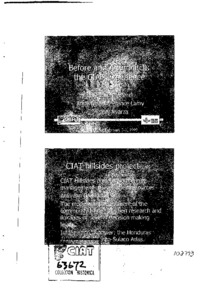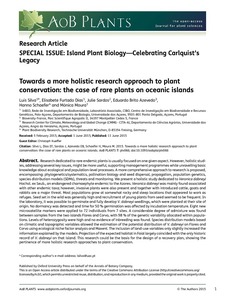Traditional strategies and adaptive resource use by crop-livestock producers in the Sahel
This presentation concerns the key property rights issues arising in the West African Semi-Arid Tropics (WASAT). The WASAT contains three main agro-climatic zones: Sahel (300–600 mm of annual rainfall falling in 2.5–4 months); Sudanian (600–900 mm, 4 to 6 month rainy season); and Guinean (900–1100 mm, 6–7 month rainy season). The author presented a conceptual framework to explain the responses that farmers in the WASAT region have adopted to deal with changes in their environment.
Tools for disaster mitigation workshop : Before and after Mitch: The CIAT experience
Towards a more holistic research approach to plant conservation: the case of rare plants on oceanic islands
Research dedicated to rare endemic plants is usually focused on one given aspect. However, holistic studies, addressing several key issues, might be more useful, supporting management programs, while unravelling basic knowledge about ecological and population level processes. A more comprehensive approach to research is proposed, encompassing: phylogenetics/systematics, pollination biology and seed dispersal, propagation, population genetics, species distribution models (SDMs), threats and monitoring.
The 'Trickle Down' of IWRM: a case study of local-level realities in the Inkomati Water Management Area, South Africa
The historical legacy in South Africa of apartheid and the resulting discriminatory policies and power imbalances are critical to understanding how water is managed and allocated, and how people participate in designated water governance structures. The progressive post-apartheid National Water Act (NWA) is the principal legal instrument related to water governance which has broadly embraced the principles of Integrated Water Resources Management (IWRM).
Towards voluntary guidelines for people-centred land-water tenure: the untapped synergies between rights-based land and water governance
Water is absent in the ‘Voluntary Guidelines on the Responsible Governance of Tenure of Land, Fisheries and Forests in the Context of Food Security’ (FAO, 2012). This paper explored whether and how the people-centred approaches and the human rights values that underpin this document can be better applied in the water sector and how more recognition of the land-water interface can support this.
Trends and Outlook: Agricultural Water Management in southern Africa. Country report - South Africa. [Project report submitted to United States Agency for International Development’s (USAID’s) Feed the Future Program].
Trends and Outlook: Agricultural Water Management in southern Africa. Country report - Zambia. [Project report submitted to United States Agency for International Development’s (USAID’s) Feed the Future Program].
Understanding groundwater storage changes and recharge in Rajasthan, India through remote sensing
Groundwater management practices need to take hydrogeology, the agro-climate and demand for groundwater into account. Since agroclimatic zones have already been demarcated by the Government of India, it would aid policy makers to understand the status of groundwater recharge and discharge in each agroclimatic zone. However, developing effective policies to manage groundwater at agroclimatic zone and state levels is constrained due to a paucity of temporal data and information.




